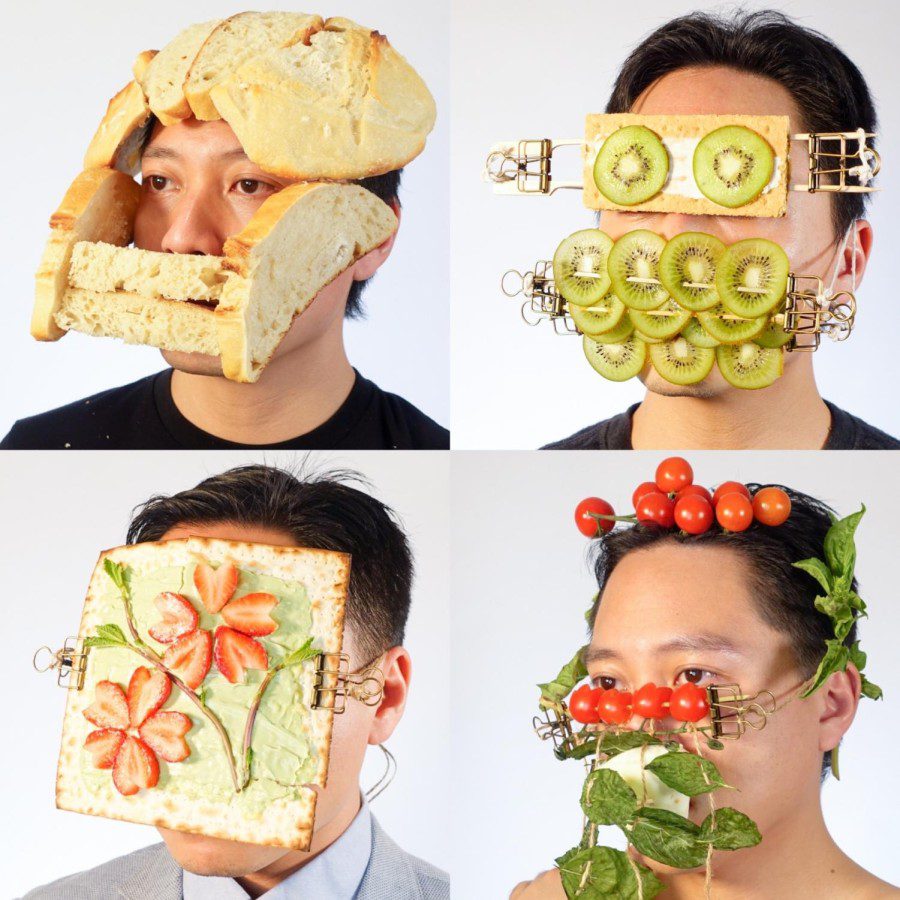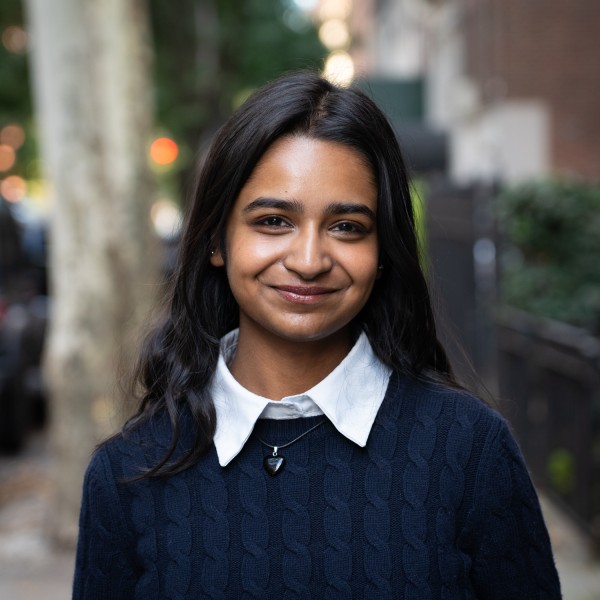Q&A: Foodmasku on channeling emotions into food mask art
Instagram artist Foodmasku on turning isolation into funny food masks, gun violence in America, and his plans for the future.
December 9, 2022
Content warning: This article contains descriptions of gun violence.
I first saw Antonius Wiriadjaja, better known as Foodmasku, at The Invisible Dog Art Center located in Downtown Brooklyn. He was sitting in the middle of a dining table while a couple devoured the multiple-course meal that was strapped to his face. Foodmasku makes his meals into masks and posts headshots of them on Instagram –– some including a take on an Upside-Down Pineapple Cake and a Rambutan Pie –– as a creative response to the isolation we have collectively experienced due to the pandemic. He has over 12 thousand followers and The New York Times featured him as one of the five current art accounts to follow.
While his popular series focuses on aspects of joy and creativity, his other work includes a photo series of his scars after surviving a gunshot to his stomach. Foodmasku’s work is an exploration of resilience, as he shows the importance of art for dealing with collective and personal trauma.
This interview has been edited for length and clarity.
WSN: You’ve been very vocal about gun violence rights as a victim yourself. Tell us about your experience and the photo series that came out of it.
Foodmasku: I was walking towards the subway the day after the Fourth of July. I heard what I thought were fireworks, but then I realized that the woman in front of me had fallen. I looked down and saw that I was also shot. I ended up in a coma. When I woke up, I was the happiest and angriest person. I needed to express these emotions, so I started taking photos of my scars every single day.
At first, it was just to show my friends that I was getting better, but then I started to get a lot of attention from strangers online. While most of them were very supportive, there were also many people who didn’t like what I was expressing. I was trying to show that this is what happens when there are too many people with guns in this country. I kept taking these photographs –– I didn’t really know what else to do –– until my shooter was put on trial. At that moment, it felt like the project had finished and I moved on to other things.
WSN: How do you think you channeled these intense emotions into your current project?
Foodmasku: I think what I was expressing was my hardest residential trigger –– my experience going through trauma and how it never goes away. When COVID-19 hit, I realized that the entire world was experiencing a collective trauma. Trauma makes you remember things stronger, and not just the bad things. I remember all the moments of kindness, like my nurse playing tic-tac-toe with me or the first time I was able to lift something more than a cup. All those little memories that made me happy were accentuated. I realized that we were living through this joyless existence, and when I started doing the food masks, it brought a lot of happiness to people –– so I kept doing it.
WSN: The pandemic played a huge role in your artwork. What direction do you see your art going in now?
Foodmasku: One thing that connected with people is we are now also transitioning into the metaverse, which is outside our reality. We are used to sharing images on the internet, but when the digital enters the physical, it makes people uncomfortable. It’s almost like the uncanny valley. I was inspired by all these random filters, like people turning into pickles. I do it with real food. It’s actually on my face.
WSN: You recently had a show in Brooklyn. What reaction did you expect from your viewers? How do you think that reception differed from your initial expectations?
Foodmasku: I was happy but shocked by the number of people who forgot that there was a performance happening. It felt like they were just watching a television show. What I wasn’t expecting were people’s varying interpretations. While some people thought it was very violent and cannibalistic, others thought it was actually very erotic and intimate.
WSN: What was your interpretation of the show?
Foodmasku: At first, I wanted it to be a celebration of us coming together after being in isolation for so long. However, I realized that we are now living through an endemic. I was really discouraged by that, but then I understood that this is just another level that I need to explore. Part of the discomfort for the audience is not knowing what I am doing. Posting videos online and having anyone see them is so normalized in this attention-driven economy, which was further accelerated because we were at home all the time. So, it felt really cringy right away when you saw it in person.
WSN: What do you do with the food after you’re done making your masks?
Foodmasku: I do eat all of it eventually. I put it in the freezer, and for any food that does fall on the floor, I compost it. People don’t realize that when you go into a restaurant, there is a lot of waste that happens that you don’t see. I’d like to say that art is not a waste. Even if an artist does choose to use food as their medium, I don’t see anything wrong with that. Personally, for me, a part of it is actually eating it because that is also where the cringe factor comes in.
WSN: Where do you see your career going next?
Foodmasku: Part of my art is that it’s almost like a marathon of creating these masks. It’s also an attempt to inspire more people to try stuff that may or may not be face-mask-related. I find the act of creating something every day very liberating. I also think that sometimes people need seasons. So I have another season of food masks on the way.
Contact Alisha Goel at [email protected].

























































































































































